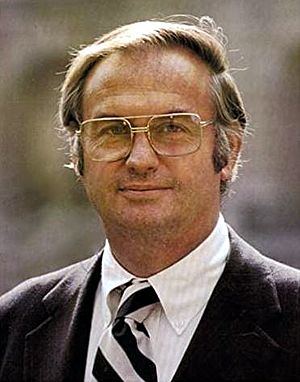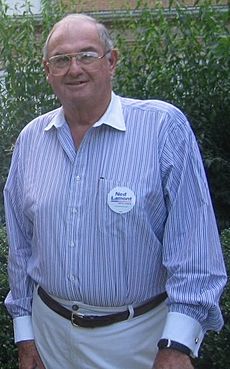Lowell Weicker facts for kids
Quick facts for kids
Lowell Weicker
|
|
|---|---|
 |
|
| 85th Governor of Connecticut | |
| In office January 9, 1991 – January 4, 1995 |
|
| Lieutenant | Eunice Groark |
| Preceded by | William O'Neill |
| Succeeded by | John Rowland |
| United States Senator from Connecticut |
|
| In office January 3, 1971 – January 3, 1989 |
|
| Preceded by | Thomas J. Dodd |
| Succeeded by | Joe Lieberman |
| Member of the U.S. House of Representatives from Connecticut's 4th district |
|
| In office January 3, 1969 – January 3, 1971 |
|
| Preceded by | Donald J. Irwin |
| Succeeded by | Stewart McKinney |
| Member of the Connecticut House of Representatives from the 154th district |
|
| In office January 1963 – January 1969 |
|
| Preceded by | Multi-member district |
| Succeeded by | Robert D. Rogers |
| First Selectman of Greenwich, Connecticut | |
| In office 1964–1968 |
|
| Preceded by | Griffith E. Harris |
| Succeeded by | John T. Taintor |
| Personal details | |
| Born |
Lowell Palmer Weicker Jr.
May 16, 1931 Paris, France |
| Died | June 28, 2023 (aged 92) Middletown, Connecticut, U.S. |
| Political party | Independent (after 1995) |
| Other political affiliations |
A Connecticut Party (1990–1995) Republican (before 1990) |
| Spouses |
Marie-Louise Godfrey
(m. 1953; div. 1977)Camille DiLorenzo Butler
(m. 1977; div. 1984)Claudia Testa Ingram
(m. 1984) |
| Children | 3 |
| Education |
|
| Signature |  |
| Military service | |
| Allegiance | |
| Branch/service | |
| Years of service | 1953–1955 (active) 1959–1964 (reserve) |
| Rank | |
Lowell Palmer Weicker Jr. (May 16, 1931 – June 28, 2023) was an American politician. He served in important roles like a U.S. Representative, a U.S. Senator, and the 85th Governor of Connecticut.
He tried to become the Republican candidate for president in 1980 but was not successful. Weicker was one of the first Republicans in Congress to worry about President Richard Nixon's part in the Watergate scandal. He was known as a "Rockefeller Republican", which meant he was more moderate. Later, he left the Republican Party. He became one of the few third-party candidates to be elected as a state governor in recent times. He won as a candidate for A Connecticut Party.
Contents
Early Life and Education
Lowell Weicker was born in Paris, France. His parents were Americans. His grandfather, Theodore Weicker, helped start the E. R. Squibb company. Lowell went to the Lawrenceville School, Yale University, and the University of Virginia School of Law.
He served in the United States Army from 1953 to 1955. He reached the rank of first lieutenant. After his military service, he began his career in politics.
Career in Congress
Weicker started his political journey in the Connecticut State House of Representatives from 1963 to 1969. He also served as the First Selectman of Greenwich, Connecticut. In 1968, he was elected to the United States House of Representatives as a Republican.
He served only one term in the House. Then, in 1970, he was elected to the United States Senate. He won because the Democratic Party's votes were split between two candidates. Weicker served three terms in the U.S. Senate, from 1971 to 1989.
Watergate and National Attention
Weicker became well-known across the country for his work on the Senate Watergate Committee. This committee investigated a major political scandal involving President Richard Nixon. Weicker was the first Republican senator to suggest that Nixon should resign.
He remembered that people in Connecticut were very supportive of President Nixon at first. They would show their disapproval of Weicker's role in the investigation. But after the Watergate scandal was over, public opinion changed, and Weicker became very popular. He was easily reelected in 1976.
Political Views and Key Votes
Weicker was known for his liberal views, even though he was in the Republican Party. This party was becoming more conservative. For example, in 1986, he was rated as the most liberal Republican in the Senate. He believed strongly in the separation of church and state. He thought it was "this country's greatest contribution to world civilization."
He voted for important laws like the one creating Martin Luther King Jr. Day as a national holiday. He also supported the Civil Rights Restoration Act of 1987. Weicker voted against some of President Reagan's choices for the Supreme Court, like William Rehnquist and Robert Bork.
Advocacy for the Disabled
Weicker was a strong supporter of rights of the disabled while he was in Congress. He worked hard on this issue, even though the Americans with Disabilities Act of 1990 passed after he left office. He was very proud of his work on this act. He also helped get funding for the National Oceanic and Atmospheric Administration and the National Institutes of Health. He also supported research into treatments for serious illnesses.
1988 Senate Election
Weicker's more liberal views caused some tension with other Republicans. In the 1988 Senate election, he was defeated by Joe Lieberman. Lieberman received support from some conservative leaders who disagreed with Weicker's political stances.
Governor of Connecticut
After losing the Senate election in 1988, Weicker became a professor. However, he decided to run for governor of Connecticut in 1990. He ran as a candidate for A Connecticut Party. He presented himself as a candidate who would bring good government. He won the election in a three-way race.
Tackling the State's Budget Problems
When Weicker became governor, Connecticut faced a huge budget problem. The state had a projected deficit of $2.4 billion. Weicker had initially promised not to create a state income tax. However, he changed his mind after seeing the financial facts. He said, "My policy when I came in was no income tax, but that fell apart on the rocks of fiscal fact."
Weicker insisted on an income tax to fix the state's finances. He vetoed three budgets that did not include it. This even led to a partial government shutdown. Finally, in 1991, the state legislature passed a budget with an income tax. This tax was set at 6%. The sales tax was lowered, and other taxes were adjusted. The budget also included $1.2 billion in spending cuts.
His actions caused a lot of controversy. A large protest rally in Hartford drew about 40,000 people. Despite the initial anger, Weicker received the John F. Kennedy Library Foundation's Profile in Courage Award. This award honors people who make unpopular but necessary decisions. Within two years, Connecticut's budget was in surplus.
Weicker did not seek re-election as governor in 1994. He said he wanted to spend more time with his children.
Later Career
In 1995, Weicker published a book about his life called Maverick. He also joined the boards of directors for several companies, including Compuware and the World Wrestling Federation (now WWE). He served on the board of Trust for America's Health, a health policy research group.
In 2006, Weicker thought about running against Senator Joe Lieberman again. He disagreed with Lieberman's support for the Iraq War. Although Weicker did not run, he supported Ned Lamont, who challenged Lieberman.
In 2016, Weicker wrote an article criticizing the Republican Party. He felt the party had moved too far to the right. He believed that choosing Donald Trump as their presidential candidate would make the party less important. In 2020, he supported Pennsylvania in a legal case about the election. Weicker had served with Joe Biden in the U.S. Senate for many years.
Personal Life
Lowell Weicker was married three times. His first marriage was to Marie Louise Godfrey, from 1953 to 1977. They had three children. He then married Camille Butler, and later Claudia Testa Ingram in 1984. His marriage to Claudia lasted until his death. He passed away at Middlesex Hospital in Middletown, Connecticut, on June 28, 2023, at the age of 92.
Images for kids
-
Weicker greeting Gerald Ford in 1976
-
Weicker with Ronald Reagan in 1988
-
Weicker campaigning with George H. W. Bush in 1988
See also
 In Spanish: Lowell Weicker para niños
In Spanish: Lowell Weicker para niños
- List of U.S. state governors born outside the United States
- Obama Republican
- Profile in Courage Award
- Rockefeller Republican
 | Roy Wilkins |
 | John Lewis |
 | Linda Carol Brown |





